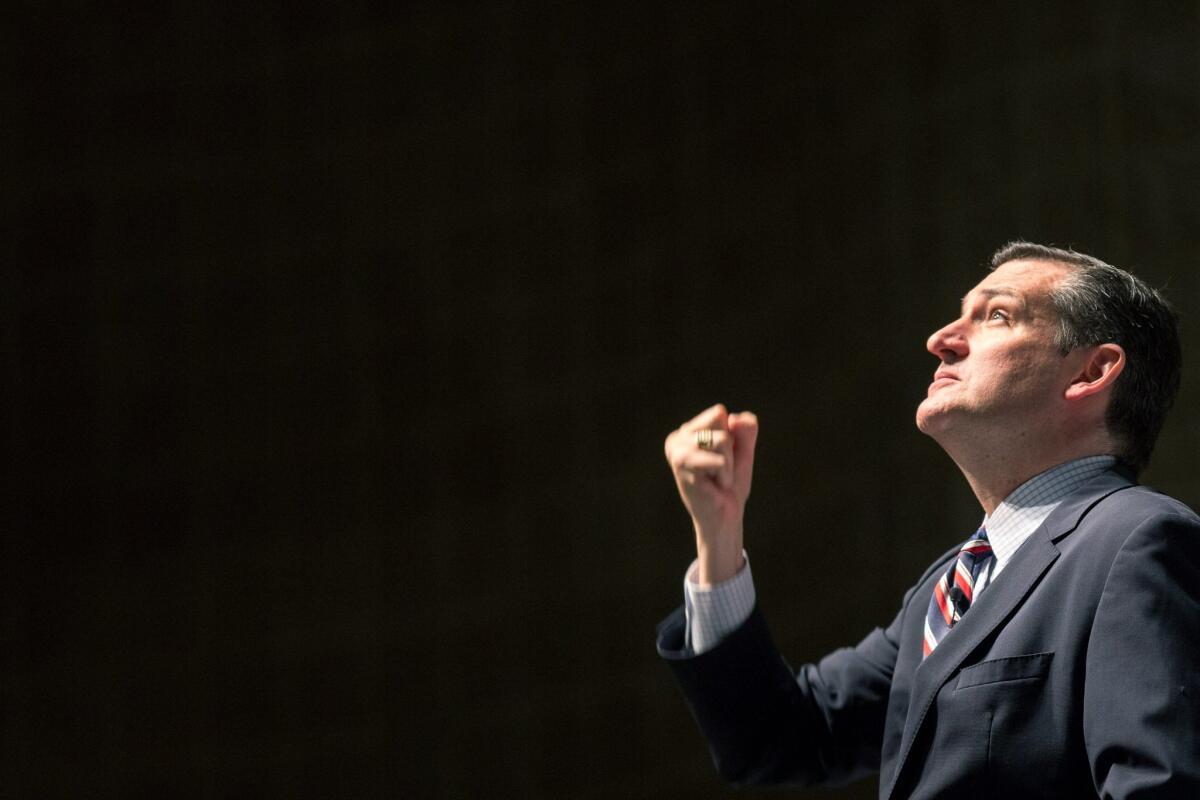A flock of GOP hawks try out their presidential wings

- Share via
Nearly a dozen of the Republicans who are running for president spent last weekend in South Carolina talking about foreign policy, and to any viewer who stumbled across the event on C-SPAN, it sounded like a contest in ferocity.
Take Florida Sen. Marco Rubio: “[When] people ask what should our strategy be on global jihadists and terrorists, I refer them to the movie ‘Taken’…. ‘We will look for you, we will find you, and we will kill you.’”
Or Wisconsin Gov. Scott Walker: “We need a commander in chief in this country who once and for all will identify that radical Islamic terrorism is a threat.… I want a leader who is willing to take the fight to them before they take the fight to us.”
Texas Sen. Ted Cruz: “We saw the ugly face of Islamic terrorism in my home state of Texas, in Garland, where two jihadists came to commit murder. Thankfully, one police officer helped them meet their virgins.”
Former Pennsylvania Sen. Rick Santorum: “If these people want to bring back 7th century Islam, my advice is: Let’s load the bombers up and bomb them back to the 7th century.”
It’s unusual for a campaign to focus so heavily on foreign policy, especially when U.S. troops aren’t locked in a ground war overseas. Primary contests normally center on the economy and domestic issues.
But this year, Republican primary voters, especially in conservative states like South Carolina, seem to want to hear about the war against Islamic terrorism; all those red-meat lines drew whoops and cheers.
A Wall Street Journal-NBC News poll this month found that when Americans are asked what problems the government should address, most cite “job creation and the economy” — but most Republican primary voters cite “national security and terrorism” instead.
So Republican candidates are narrowcasting — talking to conservative voters about the subjects they’re most concerned about.
Besides, it’s easier to criticize the Obama administration for mishandling the Middle East, which is undeniably a mess, than to complain that it’s mismanaging the economy — because job creation is up.
But slinging bloodthirsty rhetoric against Islamic terrorism is the easy part. Do Republican candidates actually have any policies to propose? In fact, they do.
Republican voters will get a choice on foreign policy. In simplified form, it’s among super hawks, more moderate hawks and one untraditional non-hawk.
The super hawks include Rubio, who has demanded tougher U.S. measures against Russia’s Vladimir Putin, called on Congress to authorize the use of U.S. ground troops against Islamic State in Iraq and Syria and sought to block President Obama’s impending agreement to limit Iran’s nuclear program, denouncing it as “a bad deal.”
Walker belongs in that truculent camp too, although his foreign policy hasn’t been fully built yet. (He’s on a trip to Israel this week to learn more about the Middle East.)
He has said the next president should abrogate any Iran deal that Obama makes. And when it comes to terrorism, he told ABC News in February, “I think anywhere and everywhere, we have to go beyond just aggressive airstrikes.… We have to be prepared to put boots on the ground.”
The leading moderate hawk is Jeb Bush, who has called for a more assertive foreign policy than Obama’s, including more defense spending, but has avoided calling for the use of ground troops against Islamic State.
On Iran, Bush has said he opposes the kind of agreement that Obama is negotiating, but he has left it unclear whether he would try to undo a deal if one were made.
Kentucky Sen. Rand Paul has always been this campaign’s libertarian exception. He has called for lower defense spending; he has opposed using ground troops in Iraq and Syria. Most strikingly, he has supported Obama’s negotiations with Iran.
“I do believe that negotiation is better than war,” he told NBC News last month — a bold position in this GOP field.
Cruz deserves special mention: The senator has staked out an unusual mix of aggression and restraint. He has called for more airstrikes against Islamic State but opposed deploying ground troops, and he insists that U.S. objectives overseas should be limited.
“The largest country Ronald Reagan ever invaded was Grenada,” he said recently. “It is not the job of the U.S. military to engage in nation building.”
But those nuances were difficult to hear at the South Carolina conservatives’ conference. The candidates, in trying to appeal to Republican primary voters, sounded out of tune with the rest of the electorate.
Most GOP voters support using ground troops in Iraq and oppose a nuclear deal with Iran, according to polls; most non-Republicans disagree on both counts.
As candidates look for ways to stand out, their debates could push some to sound even more bellicose. If Republican hopefuls continue in that direction, they’re likely to accomplish something that once seemed impossible: They’ll make Hillary Rodham Clinton look like the antiwar candidate.
Twitter: @doylemcmanus
Follow the Opinion section on Twitter @latimesopinion and Facebook
More to Read
Sign up for Essential California
The most important California stories and recommendations in your inbox every morning.
You may occasionally receive promotional content from the Los Angeles Times.














